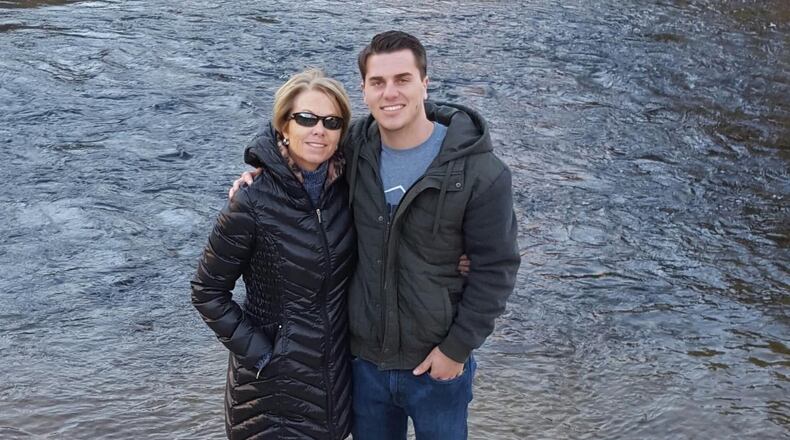Kathi Holmes Abraham’s 19-year-old son, Joseph, couldn’t save his own life from opioid addiction, but perhaps — a little more than a year after his death — he can help save others.
“His life is not going to be in vain,” said Abraham, a teacher from Lawrenceville, who lost her youngest son after he accidentally took a fatal mixture of heroin and fentanyl in his upstairs bedroom. “I want to make sure this doesn’t happen to anyone else.”
Joseph Abraham is featured in a 15-second public service announcement, which runs through July 20. It is currently being shown during previews in 17 theaters in Georgia. So far, Abraham has viewed it on a computer but has not been able to bring herself to watch it on the big screen. Still, she hopes others will get the message.
The public service announcement is strategically placed to hit a specific demographic of people who range from high-school age to those in their 30s.
The U.S. Attorney's Office for the Northern District of Georgia, in partnership with the Atlanta-Carolinas High Intensity Drug Trafficking Area Program, released the opioid public service announcement last month to show the human toll of the opioid epidemic in Georgia, which claimed more than 1,034 lives in 2017, an increase of 20 percent from the previous year.
>> RELATED: Alpharetta mother wonders if she missed early signs of addiction
>> MORE: Doctors and the opioid crisis: An AJC investigation
And that may just be the tip of the iceberg. The figures don’t show the number of people who were revived through the use of Narcan, which is used in the emergency treatment of someone who has overdosed — or is suspected of overdosing — on opioids.
“Raising awareness has to be one of the components in fighting this epidemic,” said U.S. Attorney for the Northern District Byung J. Pak. “You can’t have law enforcement only. We found that a lot of folks are really not in tune with the risks of taking pain medication.”
Kathi Abraham also wants families to be more aware of the dangers.
“We live in an area where people have had their heads in the sand about the opioid epidemic,” she said. “I think they’re digging out now, but there are still a lot of parents who don’t want to know about it, there’s such a stigma. We’ve got to get out there and talk about it.”
Young adults ages 18-25 are the biggest abusers of opioid pain relievers, anti-anxiety medications and ADHD stimulants, according to the National Institute on Drug Abuse.
Pak said other efforts are in the works, including one that will tie into the Super Bowl, which will be held in Atlanta in 2019.
Ironically, Abraham got the call from officials about using Joseph in the PSA on May 25, the day before the one-year anniversary of his death.
“It was tough walking through that,” she said of the timing. “God’s in this somehow.”
Joseph Abraham died on the same day within minutes of his childhood friend, Dustin Manning, 18, who lived half a mile away. Manning also died of an overdose.
>> RELATED: During the opioid crisis, regular citizens are saving lives
Kathi Abraham, who thinks education is critical to fighting the epidemic, said her son struggled for years with drug use. She thinks his use of painkillers may have started as early as the eighth grade when he had his wisdom teeth removed. “I don’t really know what came first, the chicken or the egg,” she admitted. “I didn’t think anything of it at the time. He was prescribed them for the pain.”
She thinks he learned at an early age after several medical procedures “how to get rid of the pain.” When he was still young, Joseph Abraham also suffered the loss of two close friends — one from cancer and the other in a drowning accident.
“It impacted him greatly,” she said. “He prayed and struggled with the concept of God.”
Kathi Abraham and her husband, David, tried to intervene. They sent Joseph to drug rehab, therapy and a sober living facility.
It seemed to work, for a time, but he always went back to drugs.
“He always had his ideas about how the world should work,” she said. “He was very forward-thinking. He was looking for purpose, and I think this is his greater purpose.”
Abraham said her friends praise her for sharing Joseph’s story. They call brave. A hero.
She doesn’t see it that way.
“We’re just trying to honor our son,” she said. “The Band-Aid is there, but the scar is never going to heal.”
About the Author
Keep Reading
The Latest
Featured



